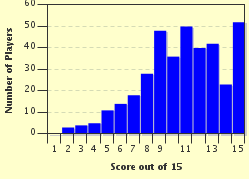Quiz Answer Key and Fun Facts
1. ART: Which French painter caused an uproar when he exhibited his painting "Olympia" in 1865?
2. MUSIC: Which of these Francophone singers is actually Belgian, not French?
3. SPORT: Which French football player was sent off during the 2006 FIFA World Cup final?
4. FOOD and DRINK: Which of these beers is French?
5. PEOPLE: Who came first on the French TV programme "Le Plus Grand Français de tous les temps" (The Greatest Frenchman of all Time) in 2005?
6. GEOGRAPHY: In which of these African countries is French not listed as an official language?
7. HISTORY: Which of the following is a French national heroine and Roman Catholic Saint thanks to her defiant stance against the English in the Hundred Years' War?
8. FOOD and DRINK: If you found yourself in Brittany, it's likely that you'd be offered some "sistr" by the locals. If you accepted, what you be given?
9. CINEMA: Which French film director boasted "Pickpocket" (1959), "A Man Escaped" (1956), "The Devil, Probably" (1977) amongst his sparse oeuvre?
10. SPORT: To what did the annual European rugby competition, formerly known as the Home Nations Championship, change its name when France joined in 1910?
11. PEOPLE: Who came second in the French TV programme "Le Plus Grand Français de tous les temps" (The Greatest Frenchman of all Time) in 2005? Clue: he lends his name to a process applied to food.
12. LITERATURE: Which French writer gave the world the cycle of twenty novels known as "Les Rougon-Macquart", and courted controversy through his open letter "J'accuse" defending Alfred Dreyfus?
13. FOOD and DRINK: What is "ragout"?
14. GEOGRAPHY: The English call it the English Channel, but what do the French call the stretch of water that links the Atlantic Ocean to the North Sea?
15. LANGUAGE: Which of the following is NOT a lexical borrowing (i.e. words from one language used in another) from French into English?
Source: Author
thula2
This quiz was reviewed by FunTrivia editor
stedman before going online.
Any errors found in FunTrivia content are routinely corrected through our feedback system.

